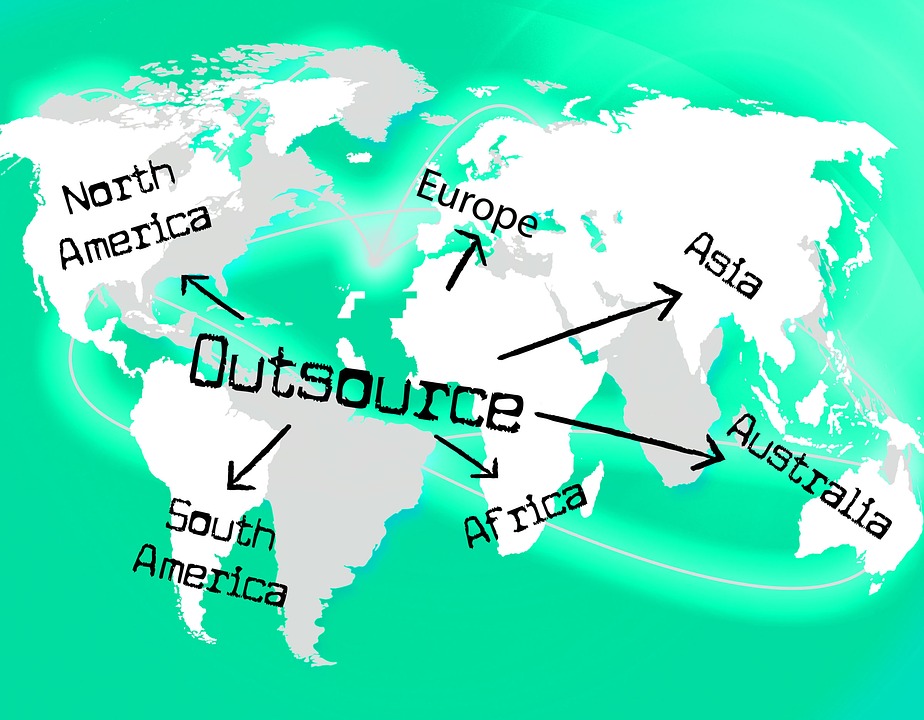Difference Between Insourcing and Outsourcing
Key Difference – Insourcing vs Outsourcing
The key difference between insourcing and outsourcing is that insourcing is assigning a task or a project to a party within the company instead of hiring an outside company whereas outsourcing is the practice of contracting out a task or a project to a third party company. These are two options that an organization can select from when it wishes to undertake a special project or regular operations. Both options have their own advantages and disadvantages thus, businesses should carefully evaluate both options prior to making a decision.
CONTENTS
1. Overview and Key Difference
2. What is Insourcing
3. What is Outsourcing
4. Side by Side Comparison – Insourcing vs Outsourcing
5. Summary
What is Insourcing?
Insourcing refers to assigning a task or a project to a party within the company instead of hiring an outside company.
E.g. ADF Company wishes to design a new system to record employee details. ADF has an in-house IT department with 15 employees to which ADF assigns this new project.
The decision as to whether a task or project should be insourced depends on the availability of suitable skills within the organization. In the above example, if the new system is a very complicated one and ADF believes that the IT staff does not possess the necessary skills to build the new system, then insourcing will not be successful.
Advantages of Insourcing
Insourcing is ideal for companies who wish to maintain control over the task or project. The employees in the company will be handling the work thus it is convenient to maintain sufficient control. In addition, insourcing has the below advantages.
- The employees are familiar with how the business works, thus what is expected depending on the objectives of the business.
- Costs may be lower since the use of existing resources.
What is Outsourcing?
Outsourcing refers to the practice of contracting out a task or a project to a third party company. Outsourcing can be seen as a common trend in many industries. Many companies outsource support functions such as HR, payroll, and accounting to specialized companies. Sometimes, businesses outsource operations to companies outside the country; which is called ‘offshoring’.
E.g. GHF Company decides to outsource its HR function to an independent HR firm since it believes that it may be cheaper than retaining an in house HR department.
Advantages of Outsourcing
The main advantage of outsourcing is the ability to focus on core activities of the business by contracting out the non-core activities. Further, cost savings are often enjoyed when outsourced since the outsourcing company (third party Company) may have economies of scale that will be passed on to the company in the form of cost savings. In addition to saving on overhead and labor costs, the reasons companies employ outsourcing include improved efficiency and greater productivity.
A Service Level Agreement (SLA) is entered into by the company with the third party that states the nature of the task or project required to be completed and the expected level of quality and other standards that should be met. Whilst there are many advantages of outsourcing, this type of a contract has the risk where confidential information of the company may be acquired by the third party company. Further, there will be no guarantee that the expected quality standards will be met or whether the outsourcing alternative is cost effective since the company has limited control over the task or the project.

What is the difference between Insourcing and Outsourcing?
Insourcing vs Outsourcing | |
| Insourcing is assigning a task or a project to a party within the company instead of hiring an outside company. | Outsourcing refers to the practice of contracting out a task or a project to a third party company. |
| Key Advantage | |
| Control over the project or task can be maintained by the company in insourcing. | Could focus on core activities of the business by 0utsourcing the non-core activities. |
| Confidentiality | |
| With an insourcing option, sensitive company information will not be at a risk. | Confidentiality and security issues may arise as a result of outsourcing agreements. |
| Cost | |
| Costs may be lower if existing resources are used. | Cost savings are often enjoyed due to economies of scale. |
Summary – Insourcing vs Outsourcing
The key difference between insourcing and outsourcing depends on whether the operation is carried out by the employees in the organization (insourcing) or by a third party company (outsourcing). The decision whether to insource or outsource a project or a task depends on its nature and the intended outcome; outsourcing is an activity that has gained much popularity during recent times. Furthermore, it may be cost effective to outsource or insource and this will vary depending on each situation.
References:
1. Insourcing.” Investopedia. N.p., 29 Sept. 2010. Web. 17 Apr. 2017.
2. “What is outsourcing? – Definition from WhatIs.com.” SearchCIO. N.p., n.d. Web. 17 Apr. 2017.
3. Amy. “Insourcing Versus Outsourcing: Which One To Choose For My Business?” E-Motive: Latest E-Commerce News, Selling Tips, Statistics and More. N.p., 05 Aug. 2015. Web. 17 Apr. 2017.
Image Courtesy:
1. “1345109” (Public Domain) via Pixabay
ncG1vNJzZmivp6x7pbXFn5yrnZ6YsqOx07CcnqZemLyue8OinZ%2Bdopq7pLGMm5ytr5Wau261zaymrqqTnruoecCnm2auo2K8tsDSqKyrm5mjtHA%3D